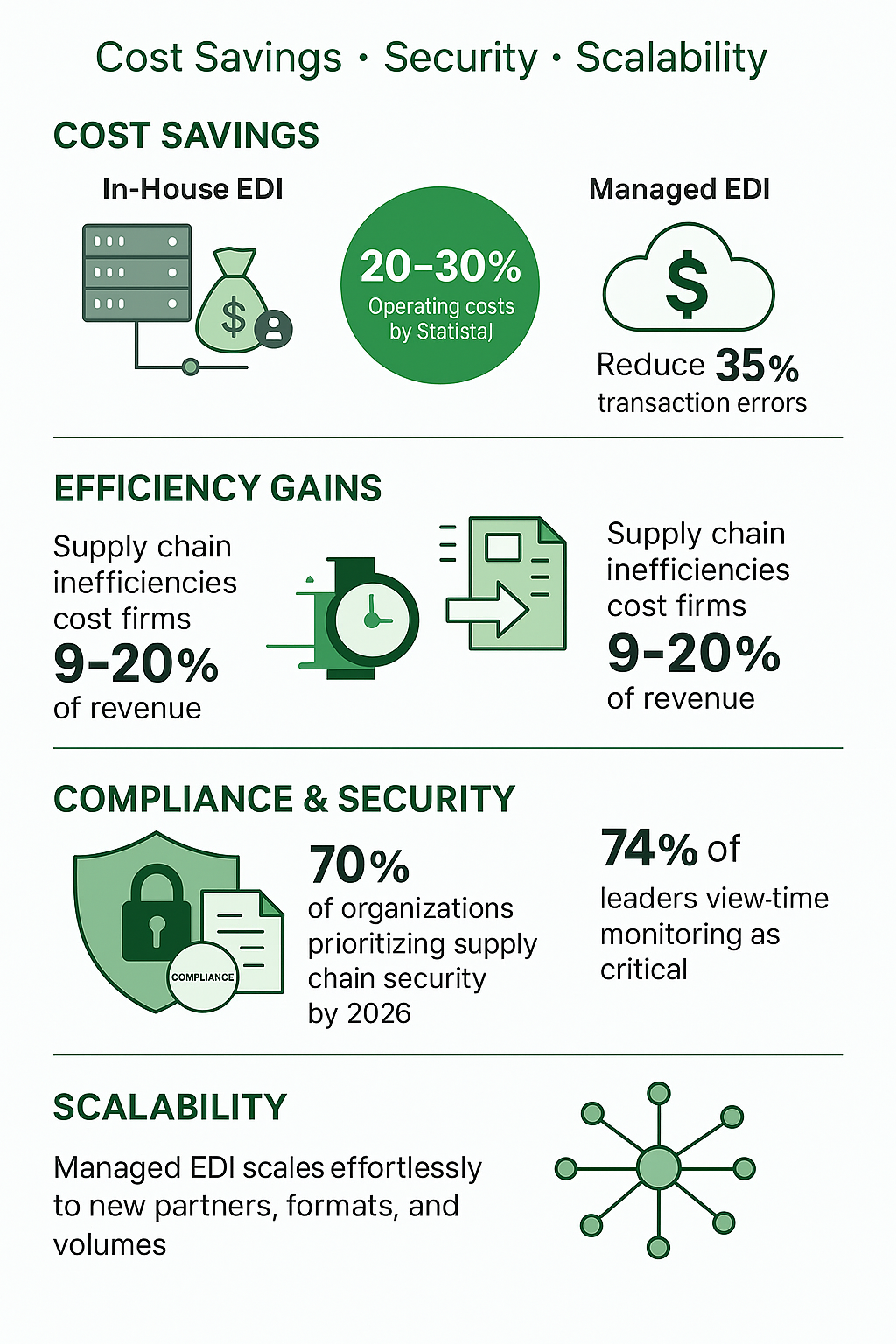Why Manufacturers Choose Managed EDI Services for Reliable B2B Integration
By Brian Eckenrod on
In today’s fast-paced supply chain landscape, the phrase managed EDI services is no longer just jargon—it’s a strategic lifeline for manufacturers and distributors. If your company is looking to streamline B2B document exchange while cutting costs and eliminating IT headaches, this article shows why outsourcing your EDI to experts is the smarter, more scalable choice.
What Are Managed EDI Services?
Managed EDI services involve outsourcing all aspects of electronic data interchange to a specialized provider—from setup, mapping, and trading partner onboarding to ERP integration, monitoring, and daily operations. Unlike basic outsourcing that merely hosts your EDI system, a managed service fully operates it on your behalf with proactive support and SLAs. Learn more about EDI standards from GS1.
Cost Savings & Efficiency Gains for Manufacturers
One of the strongest arguments for outsourcing EDI is cost reduction. Maintaining in-house EDI—including software licenses, hardware, and specialized staffing—can absorb a significant share of IT budgets. Outsourcing converts this into predictable operating expense and typically eliminates 20–30% of associated costs while reducing error-prone manual work.

Industry data backs this up: According to a
Statista overview, supply chain inefficiencies cost businesses an estimated 9–20% of annual revenue. By outsourcing EDI to a managed provider, companies can reduce transaction errors by up to 35% and cut operating costs by 20–30% compared to in-house management.
Compliance, Security & 24/7 Reliability
EDI touches sensitive transactional data, so secure transmission, standards compliance, and high availability are essential. Managed providers deliver enterprise-grade encryption, audit-ready infrastructure, continuous updates to standards, and round-the-clock monitoring—capabilities that are costly to replicate internally. For organizations in regulated industries, aligning with ANSI X12 standards supports interoperability and auditability.
Security focus: Gartner notes that over 70% of organizations will prioritize investments in supply chain security and compliance technologies by 2026. A 2023 McKinsey study found that 45% of supply chain leaders view real-time monitoring as a critical capability to reduce risks and ensure compliance.
Fast Onboarding & Scalability for Distribution Businesses
Scaling trade relationships quickly is critical for distributors. A managed EDI provider streamlines onboarding, mapping, testing, and go-live across a variety of protocols (AS2, FTP, VAN) so you can add partners and meet retailer mandates without expanding internal IT headcount. See trend coverage at Supply Chain Brain.
Choosing the Right Managed EDI Service Provider
When evaluating providers, focus on:
- Coverage: Communication protocols, EDI standards, and retailer/commercial partner requirements.
- ERP integration: Breadth and depth of supported ERPs and iPaaS connectors.
- Operational model: Proactive monitoring, error handling, and clear SLAs.
- Security & compliance: Certifications, encryption, data retention, and audit support.
- Pricing transparency: Clear fees for onboarding, maps, kilocharacter usage, and support tiers.
The U.S. SBA technology adoption guide offers a helpful framework for evaluating managed IT solutions.
Conclusion
By embracing managed EDI services, manufacturers and distributors can convert complex, costly EDI operations into a streamlined service with predictable costs, stronger security, and faster partner onboarding. If you’re ready to eliminate the burden of in-house EDI and accelerate trading partner connections, our Managed EDI & B2B Services deliver proven, business-focused results.
Call to Action: Contact us today to discover how our managed EDI solutions can save time, reduce operational costs, and scale securely with your business.
Comments are closed